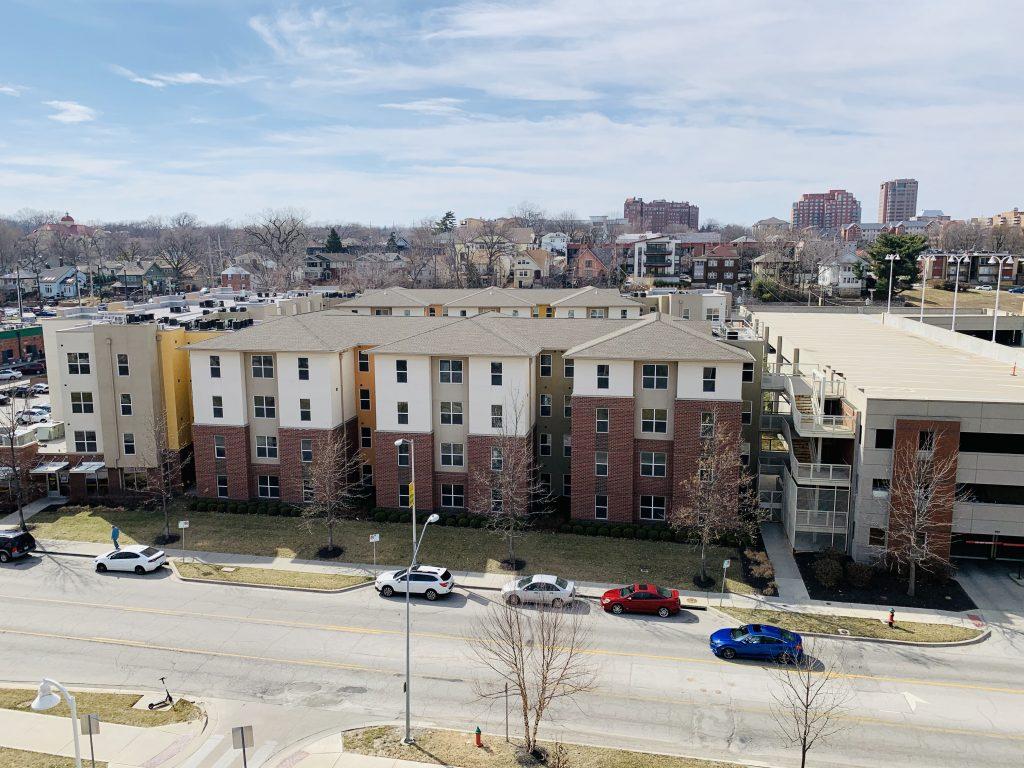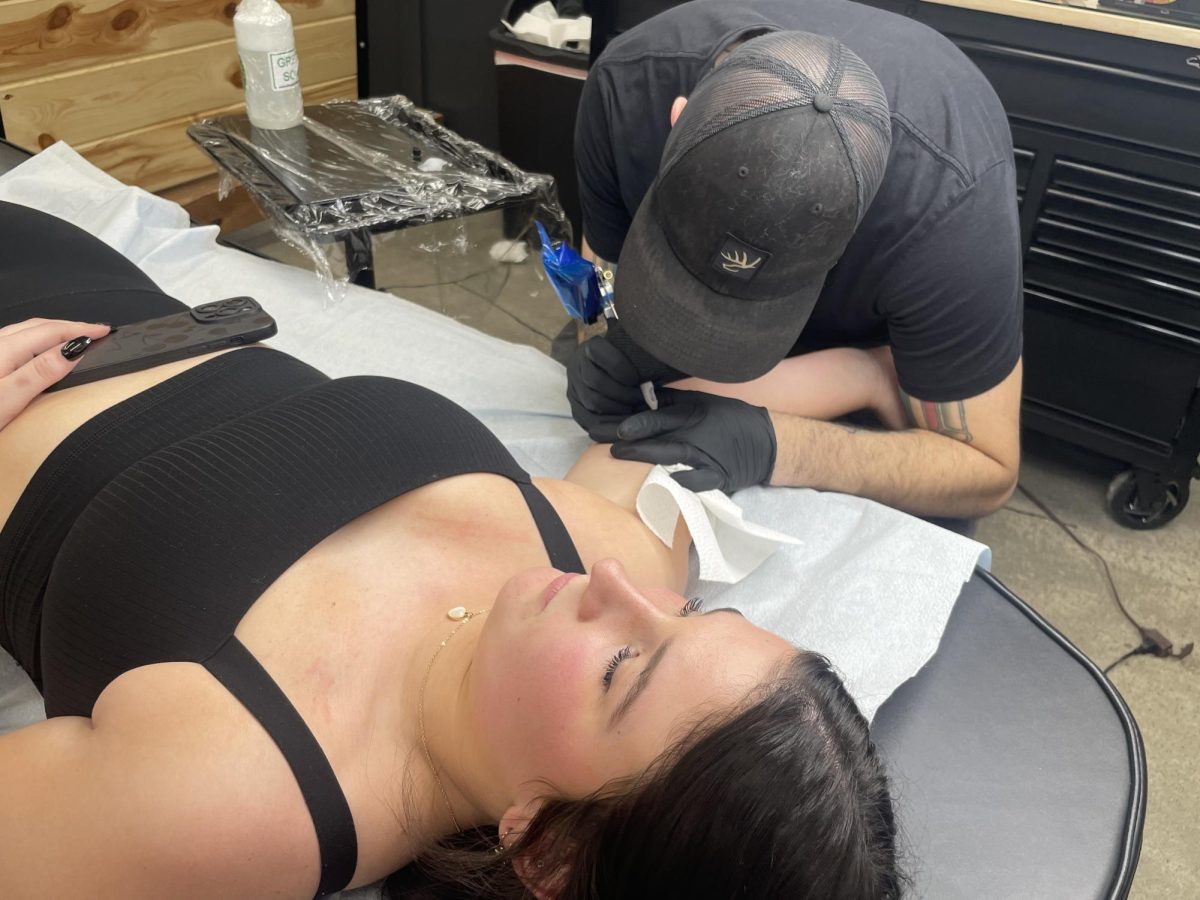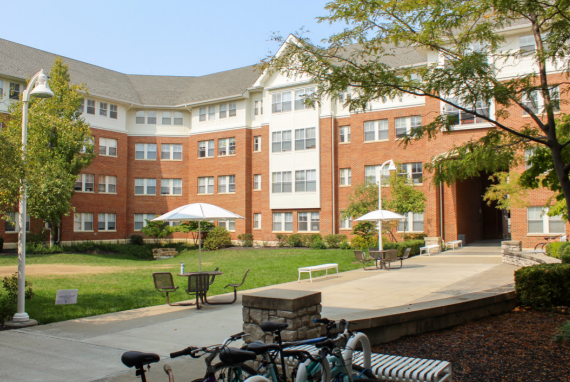Even before the announcement came, the Oak Place Apartments looked slated for destruction. Overgrown weeds, scattered equipment, ripped apart walls, hanging wires, locks and dust have taken root at the once-luxurious living area. Where there once was the bustle of students remains only faint mechanical beeping and the rush of wind through the courtyards.
In a message sent to all of UMKC last week, Chancellor Mauli Agrawal said the apartments, which have been closed for two years, were no longer considered viable for repair and would be torn down this summer.
With the exception of the large parking garage that runs through its center, the rest of the building, including still-operational student hangouts Pickleman’s Gourmet Cafe and Oak Nails, will be demolished.
As word spread among students and staff, the news did not come as a shock.
“I’m honestly not surprised just because I know their infrastructure was not great,” said Ryan Nguyen, a pre-pharmacy student.
With the exception of the two shops, the building, which housed hundreds of students, was closed down in the spring of 2018 after issues with the plumbing system caused massive water damage and an outbreak of airborne mold. Though the mold had not yet reached hazardous levels, the building was evacuated and deemed unlivable.
Since that time, little work has been done to repair the estimated $10 million in damage. A series of lawsuits and insurance claims from the university delayed progress.
After a settlement was reached with insurance providers, Agrawal said the university no longer considered repair worthwhile. Further investigation had revealed greater damage to the building, and rising costs would render refurbishment expensive.
“While we regret the loss of the building, this opens up an exciting opportunity to create a new set of amenities for our campus and students that will enhance the surrounding neighborhoods as well,” said Agrawal.
There are currently no firm plans in place to fill the soon-to-be-empty lot. There has also been no word on what will be done with the parking garage, a gated and monitored area that is largely devoid of any vehicles.
The chancellor has appointed a Campus Student Housing Study to determine what to do with the space, which occupies a large amount of valuable real estate between Oak St. and Brookside Blvd.
The university’s ability to actually build on this plot of land is questionable. According to all recent reports, the state has slashed funding to UMKC, and Agrawal has stated to UNews that money is in short supply, despite an increase in tuition last year.
The tearing down of a student housing building hinders the efforts preported by Agrawal, who has expressed his desire to make UMKC a more “residential campus.” According to the strategic plan he outlined for the schools future, Agrawal hoped to increase enrollment by 50% and provide the infrastructure to support those students.
“I would say without a doubt that I am disappointed,” said SGA President Justice Horn in a statement to UNews. “I think on the PR side of things it is an absolute disaster that UMKC is trying to move forward, and we are trying to look like we are making strides forward [on housing], but we are literally going to tear down one of our biggest buildings, and there’s just going to be an empty lot.”
The dismantling of Oak Place heralds the end of a saga of student housing issues that began after mold seeped into the air of the apartments. With issues ranging from water damage in other dorms, overcrowding, students being moved out of dorms and workers walking into students’ rooms at night, conversation surrounding housing at UMKC has often skewed negative.
In a press release, UMKC administration says, “The university’s primary focus remains to provide quality, affordable student housing to current and future students.”
Some find that the end of Oak Place flies in the face of that commitment.
“I think personally it’s going to be an embarrassment, not only to the university, but then also the university’s commitment to students and student housing,” Horn said. “It’s another gut-punch to campus involvement, and us trying to do anything for campus involvement.”
While there are no plans, Agrawal fielded the idea of a streetcar stop, along with a housing-business combination similar to that of Whole Foods and the Brookside 51 apartments. According to a study by Bank of America, Whole Foods is one of the most expensive places in the US to grocery shop. Rent for a 650 sq. ft. studio at Brookside 51 starts at around $1500, about double the cost of a two-bedroom apartment in nearby areas.
Despite the failure of the Oak Apartments, which are a little over a decade old, students hope for a new housing facility to rise in its place.
“I still want to see apartments there; I just want to see more improvements on it—like actually get it right this time,” said Nguyen.
Until then, inaccessible light bulbs still shine at Oak Place, waiting to turn off for the last time.
samuelbellefy@mail.umkc.edu








